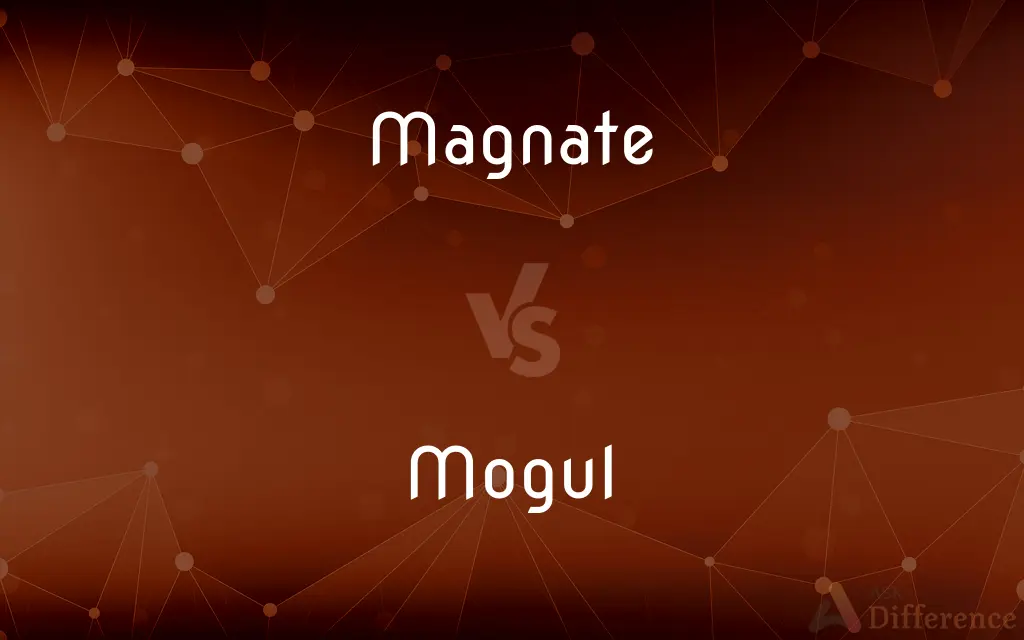Magnate vs. Mogul — What's the Difference?
By Fiza Rafique & Urooj Arif — Updated on April 3, 2024
A magnate is a powerful or influential person in a particular field or industry, while a mogul refers specifically to a powerful individual in the media industry or someone with great influence in a particular area.

Difference Between Magnate and Mogul
Table of Contents
ADVERTISEMENT
Key Differences
Magnates are known for their significant impact and leadership in industries such as steel, railroads, or technology, emphasizing their role in shaping market dynamics and economic landscapes. Moguls, although similar in influence, are often associated with the entertainment, media, and publishing sectors, highlighting their control over information, culture, and public opinion.
While the term magnate might suggest a broad spectrum of industrial domains, encompassing everything from manufacturing to digital economies, mogul is more niched, with a historical nod towards empire builders in media and entertainment. This difference not only marks the sectors they influence but also the nature of their legacy and public perception.
Magnates often amass their power through innovation, strategic business decisions, and market expansion, thus playing a crucial role in economic development and industrial advancement. On the other hand, moguls gain prominence through content creation, distribution, and the shaping of cultural narratives, thereby wielding significant soft power.
The distinction also extends to the origin of the terms, with magnate having a more generic application to leaders of major enterprises across various sectors, and mogul, derived from the historical Mughal emperors, connoting rulership and dominance in a more specific context, such as media empires.
Comparison Chart
Definition
A powerful person in a particular field.
A powerful person in the media industry or a specific area.
ADVERTISEMENT
Sphere of Influence
Broad industrial sectors.
Primarily media, entertainment, and cultural sectors.
Implication
Economic power and industrial leadership.
Influence over culture, information, and public opinion.
Origin
Generic term for industry leaders.
Originally referring to Mughal emperors, now media leaders.
Legacy
Economic development, market dynamics.
Cultural impact, shaping narratives.
Compare with Definitions
Magnate
A powerful or influential person in business or industry.
The steel magnate donated millions to charity.
Mogul
A powerful person in the media or entertainment industry.
The Hollywood mogul produced numerous blockbuster films.
Magnate
Someone with significant power and wealth in a particular sector.
An oil magnate known for his aggressive business tactics.
Mogul
An influential individual who shapes public opinion through media.
The media mogul owns television networks and newspapers.
Magnate
A leader who has a major impact on economic trends.
The tech magnate was a keynote speaker at the innovation conference.
Mogul
Someone who controls a significant portion of the entertainment industry.
The music mogul signed some of the world's biggest artists.
Magnate
An individual who shapes the direction of their industry.
A real estate magnate who owns numerous properties across the country.
Mogul
An individual whose decisions impact cultural trends and narratives.
The sports mogul owned several major league teams and influenced the game's evolution.
Magnate
Someone who is recognized for their success and influence in business.
The publishing magnate launched several successful magazines.
Mogul
A person with great power in a specific field, often related to culture.
The fashion mogul was behind the industry's most iconic brands.
Magnate
A magnate, from the late Latin magnas, a great man, itself from Latin magnus, "great", is a noble or a man in a high social position, by birth, wealth or other qualities. In reference to the Middle Ages, the term is often used to distinguish higher territorial landowners and warlords, such as counts, earls, dukes, and territorial-princes from the baronage, and in Poland for the richest szlachta.
Mogul
A small hard mound of snow on a ski slope, cast up over numerous runs by the skis of skiers as they turn.
Magnate
A powerful or influential person, especially in business or industry
An oil magnate.
Mogul
One of a set of closely spaced, artificially constructed mounds forming the course for certain competitive skiing events.
Magnate
Powerful industrialist; captain of industry.
Mogul
Moguls(used with a sing. or pl. verb) A skiing event held on such a course.
Magnate
A person of rank, influence or distinction in any sphere.
Mogul
A very rich or powerful person; a magnate.
Magnate
(historical) In medieval and early modern Italy, a member of a legally defined category of especially wealthy patrician families, often deprived of the right to political participation by republican governments.
Mogul
Mogul Variant of Mughal.
Magnate
A person of rank; a noble or grandee; a person of influence or distinction in any sphere; - used mostly of prominent business executives; as, an industrial magnate.
Mogul
A member of the force that under Baber invaded India in 1526.
Magnate
One of the nobility, or certain high officers of state belonging to the noble estate in the national representation of Hungary, and formerly of Poland.
Mogul
A member of the Muslim dynasty founded by Baber that ruled India until 1857.
Magnate
A very wealthy or powerful businessman;
An oil baron
Mogul
A rich or powerful person; a magnate, nabob.
A Silicon Valley tech mogul
Mogul
(skiing) A hump or bump on a skiing piste.
Mogul
A larger-sized (39 mm diameter) screw base used for large, high-power light bulbs, known as mogul (screw) base light bulbs.
Mogul
A machine that forms shaped candies from syrups or gels.
Mogul
(skiing) To ski over a course of humps or bumps.
Mogul
A person of the Mongolian race.
Mogul
Any of the Mongolian peoples who conquered parts of India and established an empire lasting from 1526 to 1857. Also, any of their descendents.
Mogul
A heavy locomotive for freight traffic, having three pairs of connected driving wheels and a two-wheeled truck.
Mogul
A great personage; magnate; autocrat; as, an industrial mogul.
Mogul
A bump on a ski slope
Mogul
A member of the Muslim dynasty that ruled India until 1857
Mogul
A very wealthy or powerful businessman;
An oil baron
Common Curiosities
What makes someone a magnate?
Being a magnate involves significant influence and leadership in a particular industry, along with economic power and success.
Can a mogul be considered a magnate?
Yes, a mogul can be considered a type of magnate, especially if their influence extends beyond the media or entertainment sectors.
What is required to become a magnate in a sector?
Becoming a magnate requires innovation, strategic decision-making, significant market impact, and leadership in the industry.
What industries do magnates typically belong to?
Magnates can belong to any major industry, including technology, manufacturing, real estate, and finance.
What challenges do magnates face?
Magnates face challenges such as market competition, regulatory hurdles, and the need for continuous innovation and adaptation.
How do magnates impact the economy?
Magnates impact the economy by driving industrial innovation, creating jobs, and shaping market trends and dynamics.
Are the terms magnate and mogul interchangeable?
While they can be similar, they are not entirely interchangeable; "magnate" is broader, while "mogul" is more specific to media and entertainment.
How do moguls influence culture?
Moguls influence culture through the content they produce and distribute, shaping societal norms, trends, and values.
What is the significance of a mogul in media?
Moguls play a crucial role in media by controlling the distribution of information and entertainment, thus influencing public opinion and culture.
Why are moguls important to societal trends?
Moguls are important because they have the power to influence and shape societal trends through the media and entertainment content they control.
Can moguls change the direction of the media industry?
Yes, moguls can significantly change the direction of the media industry through their decisions on what content gets produced and distributed.
How do the achievements of magnates and moguls differ?
Magnates are often celebrated for their economic achievements and industry advancements, while moguls are recognized for their cultural impact and creative contributions.
Do magnates always start as entrepreneurs?
Many magnates start as entrepreneurs, but others may ascend to their positions through corporate leadership or inheritance.
Can someone be a magnate in the tech industry and a mogul in media?
Yes, individuals can hold significant influence in multiple sectors, being considered a magnate in one (like tech) and a mogul in another (like media).
What role do moguls play in the entertainment industry?
Moguls play a central role in the entertainment industry by financing productions, making key creative decisions, and shaping the industry's future.
Share Your Discovery

Previous Comparison
Dingy vs. Dirty
Next Comparison
Koi vs. PoiAuthor Spotlight
Written by
Fiza RafiqueFiza Rafique is a skilled content writer at AskDifference.com, where she meticulously refines and enhances written pieces. Drawing from her vast editorial expertise, Fiza ensures clarity, accuracy, and precision in every article. Passionate about language, she continually seeks to elevate the quality of content for readers worldwide.
Co-written by
Urooj ArifUrooj is a skilled content writer at Ask Difference, known for her exceptional ability to simplify complex topics into engaging and informative content. With a passion for research and a flair for clear, concise writing, she consistently delivers articles that resonate with our diverse audience.
















































